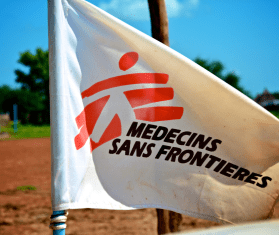
Between 1992 and 2002, MSF, within the frame of its homeless program in Moscow, has:
Read an interview with Hedwige Jeanmart, Coordinator of MSF's program for the homeless in Moscow. |
When MSF began its program for the Moscow homeless population in May 1992, there were about 30,000 homeless persons in Moscow—30,000 persons with no access to medical or social services. In response, MSF started providing emergency medical consultations for them in the capital's train stations; the organization's main objective was, and today remains, to increase access to preventive and curative health care for the homeless and to facilitate their re-integration into society.
Today there are estimated to be over 100,000 homeless persons living in Moscow and over 4 million living across Russia. Yet still there is no social approach to the problem and no social answer. Last winter, 430 people, 90% of them homeless, died of cold in the streets. In the last year, 806 homeless persons died on the streets.
For 10 years, MSF has seen the homeless, listened to their suffering, offered them advice, cured their wounds, and defended their basic rights. Many tough questions arise when you look back at 10 years of work. And an essential one is: Are there reasons to celebrate this anniversary? The mere fact that our program has been running for 10 years is a sad sign that the problem still exists. But there are also positive results—signs that our daily refusal of the unacceptable has borne its fruits. It is these fruits—not always as big or as ripe as we would have liked them to be—that we have chosen to consider on our 10th anniversary.
MSF's Assistance to the Homeless
MSF's program for the homeless in Moscow, begun in 1992, was at first strictly medical. It soon became clear that the medical approach offered patients much-needed but only temporary relief. MSF thus decided to incorporate social consultations into its program. The realization that external factors—such as bureaucratic obstacles, the negative image of the homeless among the general population, indifference among officials and decision-makers—heavily impeded the social re-integration of homeless persons led MSF to further expand its program.
The program today encompasses three activities: providing medical and social assistance on a daily basis; lobbying to improve the living conditions of the homeless and their re-integration into society; and sensitizing the public to the plight of this population. These three activities converge to maximize the chances that the homeless will return to a decent life and recover their fundamental rights. The combined approach has led to substantive results described below in this report.
MSF is an international, independent, non-governmental organization, and its funds come from private, individual donations (more than 50%), as well as from international organizations and governmental institutions. Over the course of 10 years, the program for the homeless in Moscow has been financially supported by the European Union; by private donations from the Grand Duke of Luxembourg and from United Way Moscow; and by MSF proper funds.
The Daily Work: Providing Medical and Social Assistance
As a medical organization, MSF believes access to health care and to humanitarian assistance is a basic human right. The homeless, victims of social exclusion, are denied this right. Whether sick or injured, they are turned down when they want to see a doctor at a polyclinic because they have no medical insurance. Although decree #535 of the city of Moscow theoretically grants them access to polyclinics, in practice the decree is not followed—partly due to human rejection of the homeless, and partly due to a lack of financial resources allocated to cover these consultations.
MSF's program "fills the gap" in outpatient care. Our dispensary (located at Krasnogvardejski Boulevard, 17, in the building of disinfection station #1) is open six days a week from 9:15 a.m. to 7:15 p.m. and offers medical and social assistance to homeless persons who have no other access to such services. Each patient is seen by four MSF staff members: a registrar, a doctor, a nurse and a social assistant.
One particularity of MSF's dispensary is that it combines two services that mutually reinforce each other: medical and social consultations. The patients who come to see us suffer from pathologies that are closely linked to their difficult living conditions. Unless these conditions are improved, healing can only be temporary. Through individual counseling, MSF's social assistants give patients a chance to break vicious cycles.
The medical team offers immediate treatment, vaccinates patients against polio, diphteria, and tetanos, and contacts hospital and ambulance services when necessary. The number of patients varies seasonally between 50 and 100 per day—a figure that far surpasses the average number of consultations in a municipal polyclinic.
The most common medical problems affecting the homeless are not infectious diseases as is commonly imagined, but trophic ulcers and infected wounds (see graph page 8). Due to exposure to the elements, poor living conditions, and lack of access to medical care, these initially minor pathologies can lead to physical disability.
The two social assistants each see 30 to 50 persons a day. On a case by case basis—according to particular problems and needs identified during individual interviews—the role of the social assistants is to: inform homeless persons about their rights (housing, pensions, etc.); give them practical information (for example, direct them to organizations that give food, clothes, or free legal advise); and support them throughout each phase of their social re-integration.
Patients typically request help to obtain identification papers and to find a roof and a job. But in every case, acquiring temporary ID or a new passport is the first, major hurdle to getting off the streets, and MSF social consultants focus most of their efforts on this task.
When the situation warrants it, social assistants directly give the homeless material items such as clothes, shoes, or crutches. However, more than offering material assistance, MSF aims to enable individuals to regain their rights and dignity as human beings.
Lobbying to Improve Living Conditions
"Humanitarian action is more than simple generosity, simple charity. It aims to build spaces of normalcy in the midst of what is profoundly abnormal." — Dr. James Orbinski, former MSF president (Nobel Peace Prize speech, 1999)
MSF actively works to better the living conditions of the homeless. Some of the improvements made over a decade have been fully satisfactory, others have fallen short of being adequate, and still others are only at the elaboration stage.
Access to Health Care in St. Petersburg: A Positive Model
In addition to its work in Moscow, in 1996 MSF launched a program in St. Petersburg—a city harboring 50,000 homeless persons. Unlike Moscow—where MSF suffers from the absence of local partners—in St. Petersburg, the Russian, non-governmental organization Notchlejka has been very active since 1991 in the defense of homeless persons' rights. MSF thus began to collaborate closely with Notchlejka, and set up its dispensary in the organization's building.
In April 1997, the authorities of St. Petersburg adopted the "Program of Assistance to Homeless Persons and Ex-prisoners", which Notchlejka had put years of effort into developing. This program established Russia's first municipal registration point for citizens without a residential address. Registration allows these persons to recover the same, basic rights granted to any other Russian citizen.
The program also called for the creation of free health services for the homeless. Accordingly, in May 1999, the Botkin Hospital of St. Petersburg opened a medical center for homeless persons—the first of its kind in Russia. Following an information campaign targeting its patients, MSF handed over its activities to this medical center, and closed its dispensary. MSF had reached its goal: access to health care for the homeless was guaranteed, and the Botkin center was receiving 40 patients a day. On the other hand, access to hygiene services remained a problem: St. Petersburg's only disinfection station was in a deplorable state and close to being shut down. Before leaving the city, MSF fully rehabilitated the station with the financial support of the Danish government.
In St. Petersburg, MSF, allying itself with a Russian NGO, was able to play a clear role in sensitizing authorities and in catalyzing the establishment of an urban program. The example of St. Petersburg proves that constructive solutions to the homeless problem exist. The same remains to be proven in Moscow.
Access to Hygiene Services in Moscow
Hygiene is a major problem among the homeless. Absence of hygiene can not only lead to dermatological diseases and parasites, it also erects a barrier between homeless persons and society: fear, disgust, and sometimes violent rejection. Both medically and socially, access to hygiene services is thus essential for persons who do not have homes.
The Center for Epidemiology and Sanitation was the first service in Moscow to recognize the needs of the homeless and to respond to them. In 1994, it gave the homeless free access to three disinfection and sanitary stations (in these stations, people suffering from lice and/or scabies are given a treatment and a shower, while their clothes are disinfected, but not cleaned). Subsequently, the incidence of lice and scabies decreased by six times (it is now at 3,8%). This shows how a single initiative can have a valuable impact on the lives of the homeless.
The figures underscore the huge needs: in the year 2001, the stations disinfected 64,841 persons in Moscow; 52,626 of them came themselves to the facilities. The current construction of a fourth disinfection facility behind the Kursk train station should further improve the sanitary conditions of the homeless. Unfortunately, all the disinfection stations in Moscow are accessible only to persons suffering from lice and scabies. Unlike in St. Petersburg, free or cheap public showers (that would allow the homeless to take care of their personal hygiene and would help prevent diseases) do not exist in Moscow. Neither do places where they can wash their clothes.
Night Shelters in Moscow
Between 1996 and 2001, the city of Moscow created eight night shelters with a total of 1,500 beds. Staying in a night shelter gives a person the right to a temporary registration and thus access to municipal polyclinics, pensions, and other benefits.
The opening of the night shelters was a good but limited initiative: the shelters are strictly reserved for homeless persons who come from Moscow, and, since 2000, for ex-inhabitants of the region of Moscow. Among the capital's 100,000 homeless persons, only about a third of them meet this criteria. Not only are available beds clearly insufficient in number, but they are also inaccessible to a majority of the homeless.
Moreover, as a sanitary precaution, the night shelters only accept new visitors who have undergone disinfection and a medical check-up. "Emergency" night shelters are non-existent. Every winter between 350 and 450 persons—most of them homeless—die of cold in the streets of Moscow. MSF feels it is crucial to set up temporary shelters during the winter, open to all, without preconditions. We have offered the city's health and social affairs committees our logistical assistance in putting up such winter shelters. To date, the proposal has received no response.
A Glimpse at the Future : Access to Medical and Social Assistance in Moscow
During months and years, MSF has relentlessly sent letters and reports to Moscow's health and social affairs committees, inviting them to study the idea of opening a municipal center of medical and social assistance for the homeless, modeled on MSF's dispensary. MSF's proposal is based on the principle that it is the right of any sick or injured person to see a doctor. The proposal also rests on the knowledge that delaying a doctor's visit can have serious health consequences for a patient and can transform a productive citizen (a person who has the age, capacity and desire to work, but no proper documents) into a burden to society.
In the year 2001, ambulance services in Moscow sent 7,176 homeless persons to hospital emergency rooms. A stay in a hospital costs on average 2,500 rubles (about US $80) per day, and emergency interventions are often too late to prevent tragedies. In comparison, a medical consultation costs MSF 60 rubles per patient ($2). A timely visit to the doctor's can not only save lives, it can also prevent initially benign pathologies from turning into irreversible handicaps.
In April 2001, MSF was invited to present its program at the Moscow Duma. The Duma deputies found our proposal sound and unanimously voted in favor of the creation of a center of medical and social assistance to the homeless in Moscow. The center will be housed in the building of the fourth disinfection station, behind the Kursk train station. Construction works began in August, 2001, and are slated for completion by August, 2002. By winter 2002, the first medical and social center for the homeless in Moscow should open its doors. Unlike other municipal services, it will be accessible not only to Muscovites but to all homeless persons regardless of their origin.
The opening of this center will recompense ten years of efforts and will represent a leap forward towards the re-integration of homeless persons, whose basic, human needs will finally be taken into account.
The Draft of a Federal Law
During the years 2000 and 2001, Notchlejka of St. Petersburg and MSF worked together on the elaboration of a federal law "For the Prevention of Homelessness and the Re-socialization of Homeless Persons". This proposed federal law follows and counteracts another law drafted by the Ministry of Labor entitled "For the Social Rehabilitation of Vagabonds". The latter, rejected by the Ministry of Justice for breaching the Russian constitution, erred in equating homeless persons with vagabonds, and social rehabilitation with repressive measures.
The drafted federal law of Notchlejka-MSF, which is the fruit of a collaboration between two humanitarian organizations, recognizes for the first time the existence of homelessness as a social problem and not only a criminal one. The project calls for a series of concrete measures covering employment, housing policies, education and prevention, and establishes the unconditional right to ambulatory and hospital services.
The law is currently under discussion at the level of the State Duma, by a working group of which Notchlejka and MSF are participants. It will be introduced at the Assembly in the second semester of 2002.
Showing the Real Face of Homelessness
"I don't know what will become of me. I have taken the idea that I am a 'bomj' out of my head. And I have replaced it with the idea that I am a man, like any other man, and that I want and I am struggling to live. I haven't slipped down to the horrible bottom. Things are not easy right now, but I am looking for ways to survive, and I am almost certain: I will live." — Vadik E., extract from "Tell Us Your Story", a collection of letters by the homeless, Editor "Na Dne."
"BOMJ" is an acronym in Russian. Literally, it stands for "without a fixed place of residence". But in colloquial language, "bomj" has become a derogatory term for the homeless. Its few letters seem to contain, in concentrated form, a multitude of misperceptions: that the homeless are vagabonds, beggars, robbers, criminals, disease spreaders, "good-for-nothings" who deserve their lot and are to be blamed for their "destiny," and so on.
Despite the rising numbers of homeless people in Russia, one of the main obstacles to facing and tackling this social phenomenon remains the widespread negative image of the homeless. Among decision-makers, this translates into apathy or repressive measures such as "clean-up" operations. Ironically, these are called "prophylactic".
From its daily work with the homeless, MSF knows that the negative stereotypes do not correspond to the reality. Our beneficiaries are persons who find themselves in a difficult situation due to unfortunate circumstances (housing fraud, loss of employment resulting from layoffs or family problems, lengthy inprisonment for small crimes, etc.), and due to the absence of any "social net" to catch them on time and allow them get back on their feet.
While they struggle every day to get off the streets, the majority of the homeless manage to keep enough of an appearance and semblance of normality to melt into the city crowds. The person we see rummaging through garbage cans in midday or the "bomjee" we read about in the tabloids represent only a slim minority of the homeless population, the "tip of the iceberg".
An anonymous questionnaire distributed by MSF to its patients in the year 2000 reveals that their biggest wish is simply to have a "normal" life, which they define as having a roof, a job, a family. It is this incredible normality of the man in the street that MSF does not grow tired of communicating to authorities and the public at large. Always open to interviews, questions, and journalists' visits, MSF team members have also organized a poster campaign in Moscow's metro, photo exhibitions, concerts, and other awareness-raising activities which all aim to break stereotypes—the first step towards the social reintegration of the homeless.
The following data is selected from a survey that MSF conducted among 22,513 of its patients between 1995 and 2000 and show—inasmuch as statistics can—the "real face" of homelessness.
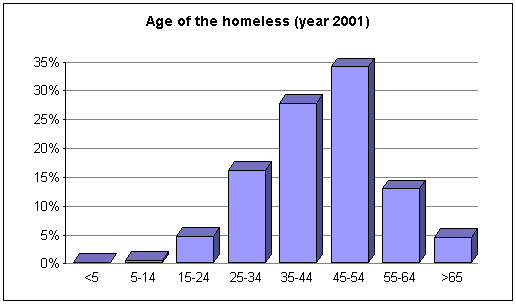
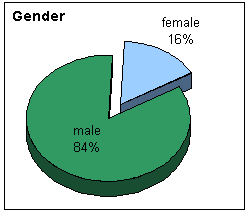
Most homeless people are of working age, are fit to work, are looking for a job, and are trying to re-integrate into society.
Half of those who consult an MSF social worker request help to find employment.
More than 80% of the homeless are men.
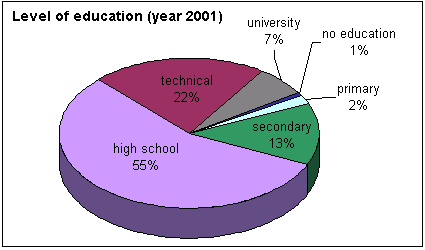
More than 1 out of every dozen homeless persons has a college-level education. 1 out of 5 has vocational training.
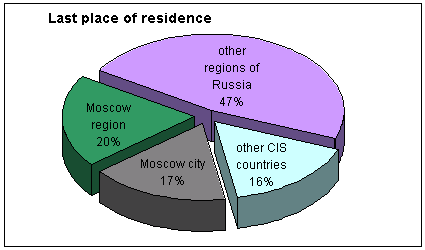
About 80% are from Russia, of which about half are from the city or region of Moscow. The rest emigrated from countries of the former Soviet Union—mainly Ukraine, Belorussia and Moldavia.
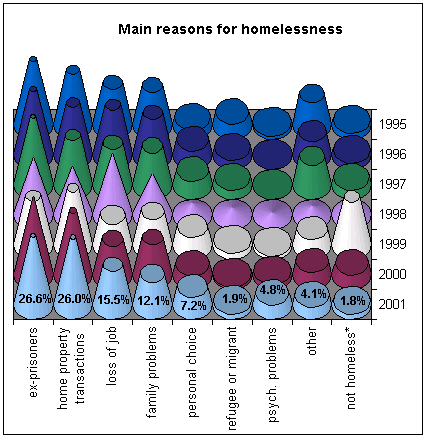
* MSF's dispensary is not restricted to the homeless. Every year a small number of persons who are poor but have a place to live come to see our doctors. As a result of the financial crisis in August, 1998, these patients were more numerous in 1999.
The waves of privatization and housing fraud in the early and mid 90's drove thousands of people to lose their jobs and apartments and end up in the streets.
For the past few years about 30% of the homeless population have been ex-prisoners. The link between incarceration and homelessness is above all legal and administrative. An old Soviet law is still in effect: the state deprives incarcerated individuals of their housing registration. As a result, they lose their right, once released, to move back into their apartments. Moreover, in violation of existing laws, the state does not provide released individuals with passports. Without these documents, it is impossible to legally earn a living or find a new home.
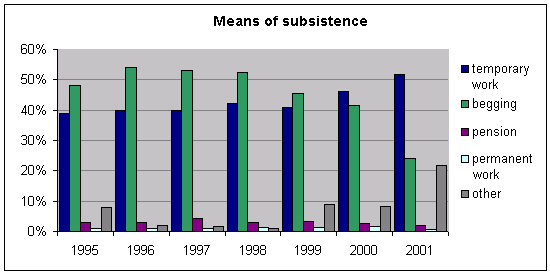
More than 45% of our patients have temporary jobs. However, as most of them have no documents, they can only find jobs that offers no contracts, no guarantees, and poor pay.
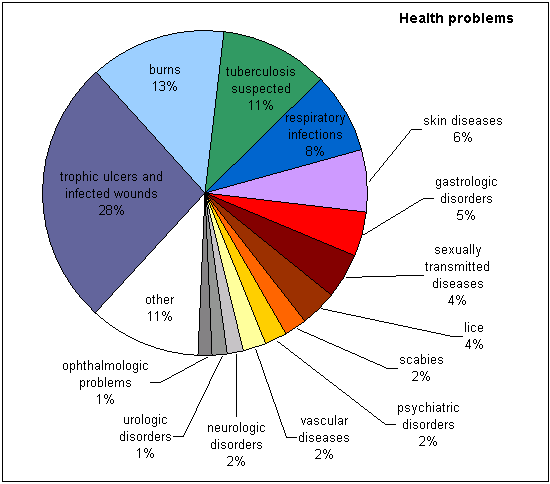
A Brief Chronology of MSF's Work with the Moscow Homeless Population
May 1992-May 2002
| 05.1992 | Launch of MSF's program of medical assistance to the homeless in Moscow: consultations in train stations, with emergency medical kits. |
| 01.1993 | MSF obtains rooms for night consultations in the train stations of Paveletski and Kurski. |
| 09.1993 | Diphteria epidemic in Moscow. Following a request from the Center of Epidemiology and Sanitation of the city of Moscow, MSF organizes a vaccination campaign for the homeless. |
| 12.1993 | Railway authorities prohibit the homeless from accessing train stations. MSF is expulsed. |
| 02.1994 | The Center of Epidemiology and Sanitation of Moscow offers MSF three rooms for a dispensary located in the building of the disinfection station #1, at Krasnogvardeiski Blvd, 17. To this day, MSF offers medical and social consultations in this dispensary. |
| 08.1994 | Access to the three disinfection stations in Moscow becomes free, leading to a significant improvement in the hygiene conditions of the homeless. |
| 07.1995 | In addition to its dispensary, MSF provides medical consultations for the homeless out of mobile buses near the train stations of Paveletski, Kievski, Kazanski, and Kurski. |
| 04.1996 | MSF receives an honorary award from the city of Moscow for its work. Although the organization is officially recognized for its role of assistance to the homeless, the city is doing nothing in favor of this population. MSF feels it is urgent to work with the authorities and incite them to take up their responsibilities. |
| 01.1997 | MSF opens a center of medical and social assistance for the homeless in St. Petersburg. |
| 04.1997 | The city of St. Petersburg adopts a program of "Aid to Homeless Persons and Ex-prisoners". Free medical assistance is included among the program's services. |
| 05.1999 | MSF reaches its goal: the Botkin Hospital of St. Petersburg opens a free medical center for the homeless, the first of its kind in Russia. Before closing its dispensary and leaving St. Petersburg, MSF fully rehabilitates the city's only disinfection center. |
| 06.1999 | In Moscow, MSF ceases to run mobile clinics near the train stations and focuses its efforts on the dispensary and on lobbying local authorities. |
| 04.2001 | MSF is invited at the Moscow Duma to present a program of medical and social assistance for the homeless that would be run by the city. Duma deputies unanimously vote in favor of the urgent need to create a center. |
| 08.2001 | The city of Moscow begins constructing the fourth disinfection center, behind the Kursk train station. This building is destined to house the municipal center of medical and social assistance for the homeless. |
| 10.2001 | In partnership with the Russian non-governmental organization "Notchlejka" of St. Petersburg, MSF drafts a federal law for the re-socialization of homeless persons. In October, a working group holds its first meeting at the State Duma to discuss this topic. |
| 05.2002 | 10 years of work with the homeless. To mark the occasion, MSF organizes a series of public events with the aim of raising solidarity and political will to solve the problem. |
We've heard that MSF is organizing some public events in favor of the homeless in the third week of May, including a concert. Could you tell us more about these events?
Yes, the concert will be at B-2 on May 23rd, at 23:00, and will feature Auktsion and Bobsleigh. We chose Auktsion because they're a popular music band from St. Petersburg who have been around since the 80's, and they have a large following. They're tuned into the social ills of today, and they're sensitive to the problem of the homeless - so when we asked them if they could play at a concert to remind the audience about this problem, they understood and quickly agreed.
On the same day, as well as on May 22nd, MSF will be collecting clothes for the homeless near the Mayakovskaya metro station, from noon until 9 o'clock in the evening. We'll have a bus parked right in front of B-2, and it should be quite visible. Anyone can give us second-hand clothes, and we will pass them on to homeless persons who need them. As long as the clothes are in decent condition, we will take them.
We're also organizing a round table between Moscow authorities and non-governmental organizations and a press conference.
What is the idea behind these events? What's the occasion?
We want to awaken gestures of solidarity - however small - for the homeless, and to remind people that in a country of about 145 million, there are more than 4 million homeless persons, and more than 100,000 in Moscow. The problem is huge, and MSF is seeing it grow into monstrous proportions. We have been working with the homeless for 10 years - in May 1992, we launched a program of medical and social assistance for the homeless in Moscow, who otherwise have no access to these basic services. So the events we're organizing are also to mark the occasion of our 10th anniversary.
So what are you celebrating after 10 years?
We've asked ourselves the same question: are there reasons to celebrate this anniversary? The mere fact that our program has been running for 10 years is a sad sign that the problem still exists, that solutions continue to be ignored, that we are up against the inertia of authorities. But there are also positive results - signs that our daily refusal of the unacceptable has borne its fruits. And though they may not be as big or as ripe as we would have liked them to be, these are the fruits we have decided to put on the table, the day of our 10th anniversary.
Does MSF also work on the problem of homelessness in other countries?
Yes, we work with the homeless in Romania and in Brazil. And in Western European countries like France, Belgium, and Italy, we work with persons who are excluded from the state's health and social services - for example, immigrants who are seeking asylum and don't have their papers in order. As a medical organization, we believe that access to health care and to humanitarian assistance is a basic human right.
What are some of the differences you see between the situation in Russia and in other countries?
Well, on the one hand, there are no differences: no matter what country excluded persons live in, or where they're from, or what their background is - eventually they all suffer from the daily struggle to survive and from poor health. But if you look at the "mechanisms" of exclusion, these mechanisms vary in different countries.
An obvious difference is that there are many more homeless persons in Russia. Also, excluded persons in Western Europe are mainly immigrants, whereas here the majority of the homeless are Russian citizens. Because they have no documents, they are "illegal" in their own country. Among the more than 8,000 patients who came to our dispensary last year, 37% were from the city or region of Moscow, 47% were from other regions of Russia, and only 16% were from other countries of the former Soviet Union - mostly Ukraine, Belorussia, and Moldavia.
Another difference is that in Western Europe, we can see that social exclusion is handed down from one generation to the next. In Russia, the problem of homelessness is relatively new, and there is still time to act, to prevent the creation of a generation of street children.
What action can be taken?
Amazingly, the issue is not so much how to assist the homeless, but how to dismantle the "machine" of bureaucratic and repressive measures that not only prevent them from re-integrating into society, but often push them further down. The main obstacle remains the registration system that ties the basic rights of persons to their official place of residence. But there are other obstacles - like the huge difficulties that most of the homeless face to get a new passport.
The people we assist are men and women who find themselves in a difficult situation because life has dealt them some hard blows. For example, the waves of privatization and housing fraud in the early and mid 90's drove thousands of people to lose their jobs and apartments and end up in the streets. Most of the homeless are educated. Most of them are men of productive age, who are fit to work and are looking for a job. And if they are given a chance, they will themselves get back on their feet.
Your description doesn't fit the typical image of the "bomj" [derogatory Russian term for "bum"]...
True, but it comes from directly working everyday with the homeless, listening to them, and collecting data from more than 22,000 patients over 5 years. The widespread, negative images of at all levels of society are one of the biggest challenges in tackling the problem. They lead to disgust and rejection or to indifference.
MSF put social posters in the Moscow metro during the 2 last two winters, with the aim of raising awareness. On the posters we wrote : "indifference kills". And it really kills. Is it not shocking that in a civilized, European city such as Moscow, a total of 430 people - 90% of them homeless - died of cold in the streets last winter? Or that ambulances in Moscow picked up 806 dead homeless persons off the streets last year?
Do the homeless at least have access to health services in case of emergencies?
Yes, they do - emergency hospitalization is a right for all Russian citizens. But this measure of last resort often cannot prevent a person from becoming an invalid or becoming chronically ill. Beyond the human tragedy, it is absurd that potentially productive citizens become a burden to society. And financially, it is also absurd. Last year, for example, more than 6,300 homeless persons were hospitalized in Moscow. A stay in a hospital costs 2,500 rubles per day. But in many cases hospitalization can be avoided by giving the persons access to a doctor before their state deteriorates.
Over the years MSF has sent more than 1,000 letter to Moscow's health and social affairs committees, proposing them to open a municipal center of medical and social assistance for the homeless (we succeeded in getting one opened in St. Petersburg in 1999). And we can finally see some light at the tunnel. Last spring, MSF was invited to present its program at the Moscow Duma. The deputies unanimously voted in favor of the creation of a center for the homeless. Now the building is under construction, behind the Kursk train station, and the center should open its doors by the end of the year to all homeless persons, regardless of their origin.
So are you seeing a slow change of mentality towards the problem, more political will to resolve it?
There are some positive signs. If you compare the past with today... Nine years ago, city officials forced us to stop giving emergency, medical consultations to the homeless near railway stations. And today, we're placing our hopes in the draft of a new federal law. It was elaborated by Notchlejka and MSF (Notchlejka is a Russian non-governmental organization from St. Petersburg, very active in defending the rights of the homeless). This law recognizes for the first time "homelessness" as a social problem and not only a criminal one, and also proposes concrete measures to help solve the problem. Just the fact that this law is currently being discussed at the State Duma, that it's on the agenda and that it will be presented - that's a huge leap forward.
So there may be more celebration ahead?
Hopefully. But I think the day we can close our program because it's not useful anymore - that's the day we will really celebrate.
Dear Marina [an MSF social consultant],
I am Konstantin Ivanovich, one of the persons you took care of. Perhaps you don't remember me (so many people come to you for help). But the fact is that I promised to write you as soon as I got home, to tell you how my problems were solved.
You made a Xerox copy of a document on the basis of which I could be issued a new passport and new registration papers. And you gave me a list of documents that I should gather in order to get at least a room in a hostel. You wrote that this is the federal law dating December 12, 1996, article 159, regarding "additional guarantees of social assistance for young orphans".
I got home thanks to your letter from MSF, because it was the only document I had on me (all my other documents were lost). In Moscow, in Vladimir, in Nizhny Novgorod, in Ekaterinburg, when I showed your letter, nobody detained me, they treated me with understanding - "a person in need, who is now trying to get back on the right track, and we know this organization."
I am very grateful. When I came to see you, you treated me with respect, sincerity, and a kind heart - which are rare qualities these days. And this is the truth, it's not flattery. And it's coming from me, a person who has seen so much, a person who was at rock bottom and wanted to commit suicide. I thought "enough, I cannot live like this anymore, and I won't". And only thanks to you and your organization, I feel that, step by step, I am becoming a human being again, a citizen of this society from which I was insensibly trying to flee.
And you could also say (God forbid) the same words that I was told in Perm: "Yes, we understand, but sorry, we can't help you with anything." and many, many humiliating words on top of that. But you didn't do this. I am sincerely grateful to you!
Thanks to you we are reborn, and this is true. I don't know how but it seems that by your inner warmth, you are able to push us away from that abyss, to instill hope in us - that not everything is lost, that we must fight, that we must live. So many people have come to you for help, and you haven't turned down a single one of them. And you have stopped or saved thousands from committing crimes.
With sincere respect,
Konstantin, Novosibirsk region, Russia
Dear compassionate guardians of kindness, dear Doctors Without Borders,
It is really so, your compassion truly knows no boundaries. Thanks to you, people have hope, and faith in the good. You are saving the lives and health of people who are unable to help themselves. Perhaps it is God's will that you exist, that you help those whom no one else helps, and who reaally need this help.
Anitsatus, Chernogorsk, Russia
Hello dear workers at 17, Krasnogvardeiski Boulevard,
In September, my son and I became victims at the Kievskiy railway station. As a result, we found ourselves without money, documents or belongings, and that is how we came to you. And my son Denis even had a fractured lower jaw. You were our saving angels. You gave us some food, found us some work to pay for our trip home, and allowed us to send a telegram. In short, you helped us stay on our feet. We humbly thank you for this. We have not "fallen". We are alive, and we feel like human beings. Damn it! We have our own roof under our heads and we sleep in our own beds. And it's awful to even imagine what could have happened! Thank you! I'm even earning some extra money by teaching French and English - this is my specialty. You are a friendly and efficient team. We all love you very much.
Natalia and Denis, Beltsy, Moldova
Hello Marina,
I would like to thank you for the help you gave me in Moscow. I am doing well, everything is fine, I'm in my hometown. I have already received my military documents, and my passport will be ready March 14th. Once again, thank you very much, to you and to all your colleagues.
Yury, Baltiysk, Russia
Dear Doctors Without Borders,
I am very grateful that you helped me get back to my life. Everything is fine now. I returned home, and I am surrounded by my parents' extensive love and care. They forgave me long ago for my "sick" escape from home to nowhere, and are very happy to see me. I'm busy getting my documents and my disability pension, and I also go fishing and do wood carvings. But I'm still thinking about creating a rehabilitation center for folks like me. Maybe your sociologist could give me a hand again, and tell me where I could study, maybe at least by taking correspondence courses. I would be very happy to contribute my own, small share to this big work of yours. May God give all of you good health, peace, love, wisdom and serenity. All the best,
Valery, Chaykovskiy, Perm region, Russia
Hello our dear doctors,
I am Andrey from the city of Orsk, Orenburg region - the Andrey you gave money to (three times) for bread and milk, the Andrey you helped to send a telegram. I wanted to tell you how I ended up in Moscow, how I found you, how I got home, and what I'm doing now.
I left the rehabilitation center "Novaya Zhizn" [New Life], located in the region of Leningrad. Drug addicts, alcoholics, and the homeless go there. So I was returning home [by train]. But in Saint Petersburg, my bag was stolen. I just put it down, turned around, went to a kiosk, and it was gone. In my pocket I had only one military service document. But in Moscow I was told that this was not proper ID. So they brought me to a detention center. Luckily they gave me a temporary ID.
The homeless advised me to go to Komsomolskaya Square. I found a job there. I was told I would get 200 rubles [US $7] a day. I decided I would stay for 3 days or so, and then I would go home. But we worked in a team of 5, and we had to split the 200 rubles between all of us. The work was terribly hard, in the cold from morning till night.
I found another employer, and worked in the city of Istra. It was better there, and easier too. I bought new shoes, and went to the railway station. But the gypsies stole my belongings.
And then I came to you. I cannot steal, and I don't want to, as I believe in the Lord Jesus Christ, who is my personal saviour. But I strayed from the right path. I got drunk. And I was punished for it. Detention center. I fell face down in the mud. I started forgetting that we all live under the eyes of God. And that we are the ones responsible for all our problems. I realized my mistake, and began praying and asking God to help me in my life as a homeless person.
And the answer came. I remembered you, MSF. I came to you to get a winter hat and some food, and I didn't expect anything more. I didn't know you could send a telegram. And I believe that God brought me to you. And you see how wonderfully things worked out? You helped me, you fed me and your souls warmed me. I would like to thank your social worker! And I thank God that I am home now, and I am doing well.
By the way, after you gave me 370 rubles [MSF helped him receive wired money], I went to the railroad station and bought a ticket. I finally left Moscow, and within 36 hours I was home. You cannot imagine how during the whole trip back, I could not believe that I was in the train, that I was heading home… home! I arrived safely. Now I am getting my papers in order.
So this is what happened to me, my dear doctors. I would be very nice to get a letter from you. If it were possible, I would declare to the whole world how grateful I am to you, MSF, and to your social consultants. That's all.
Andrey, Orsk, Orenburg region, Russia
